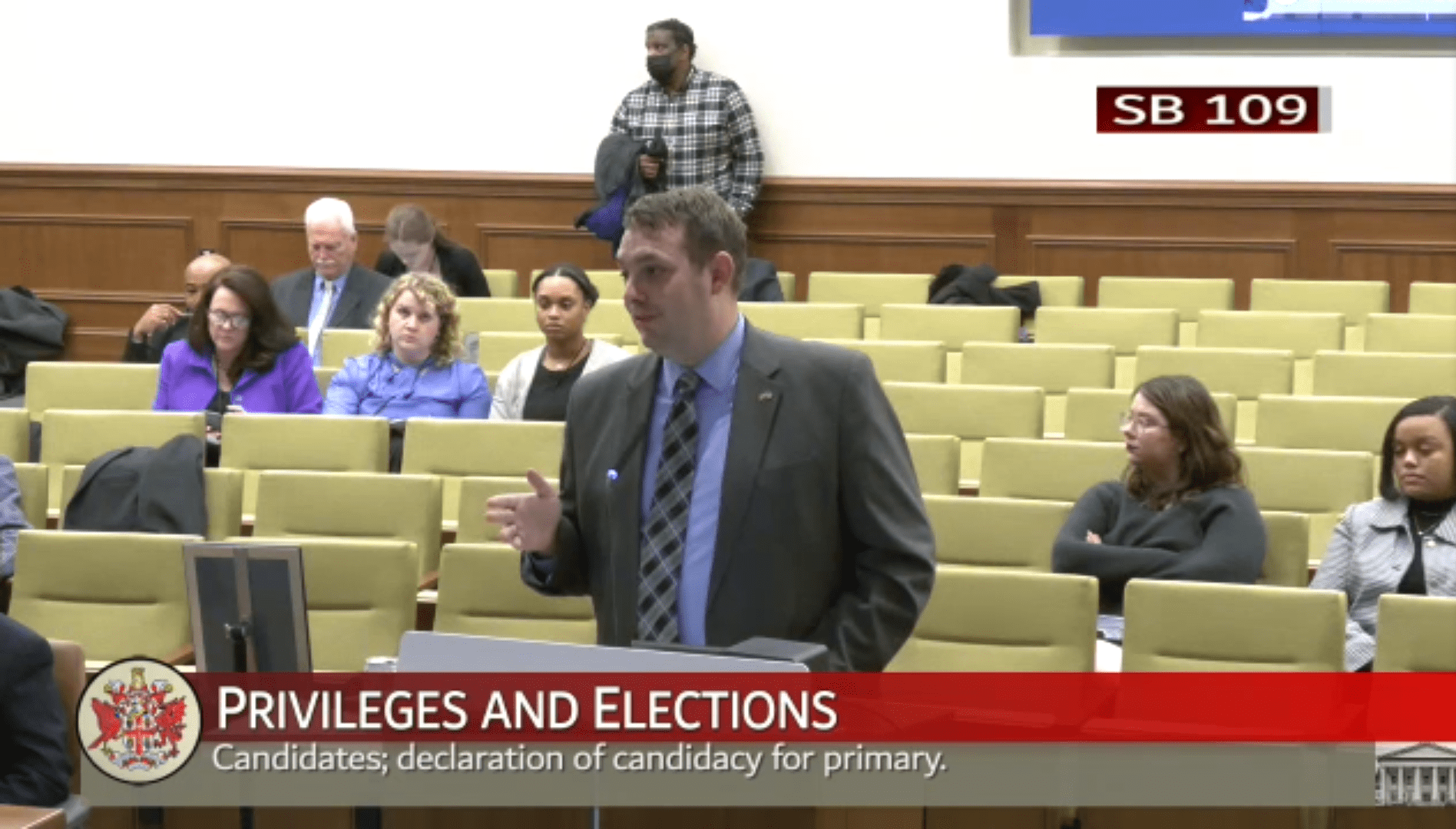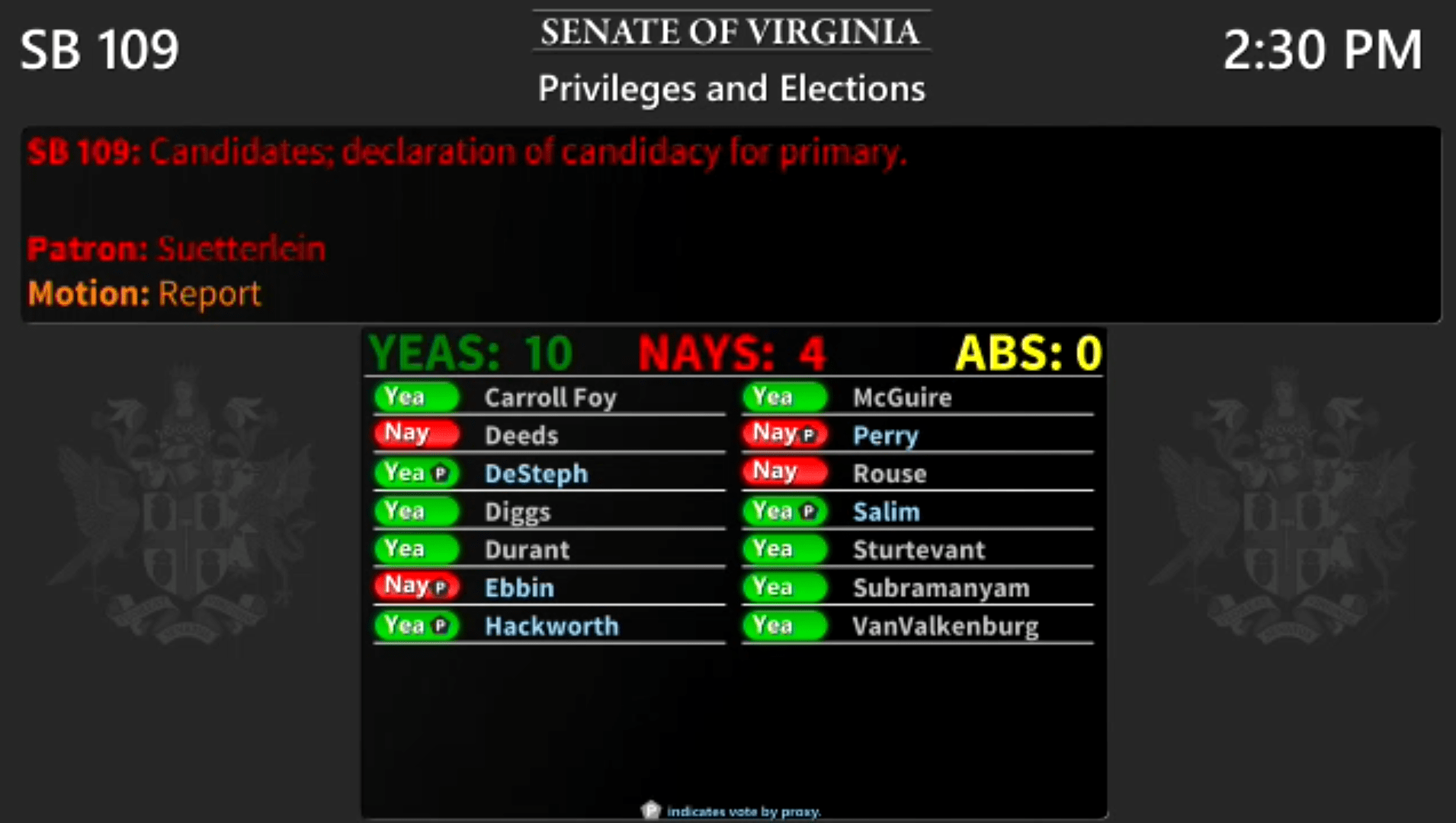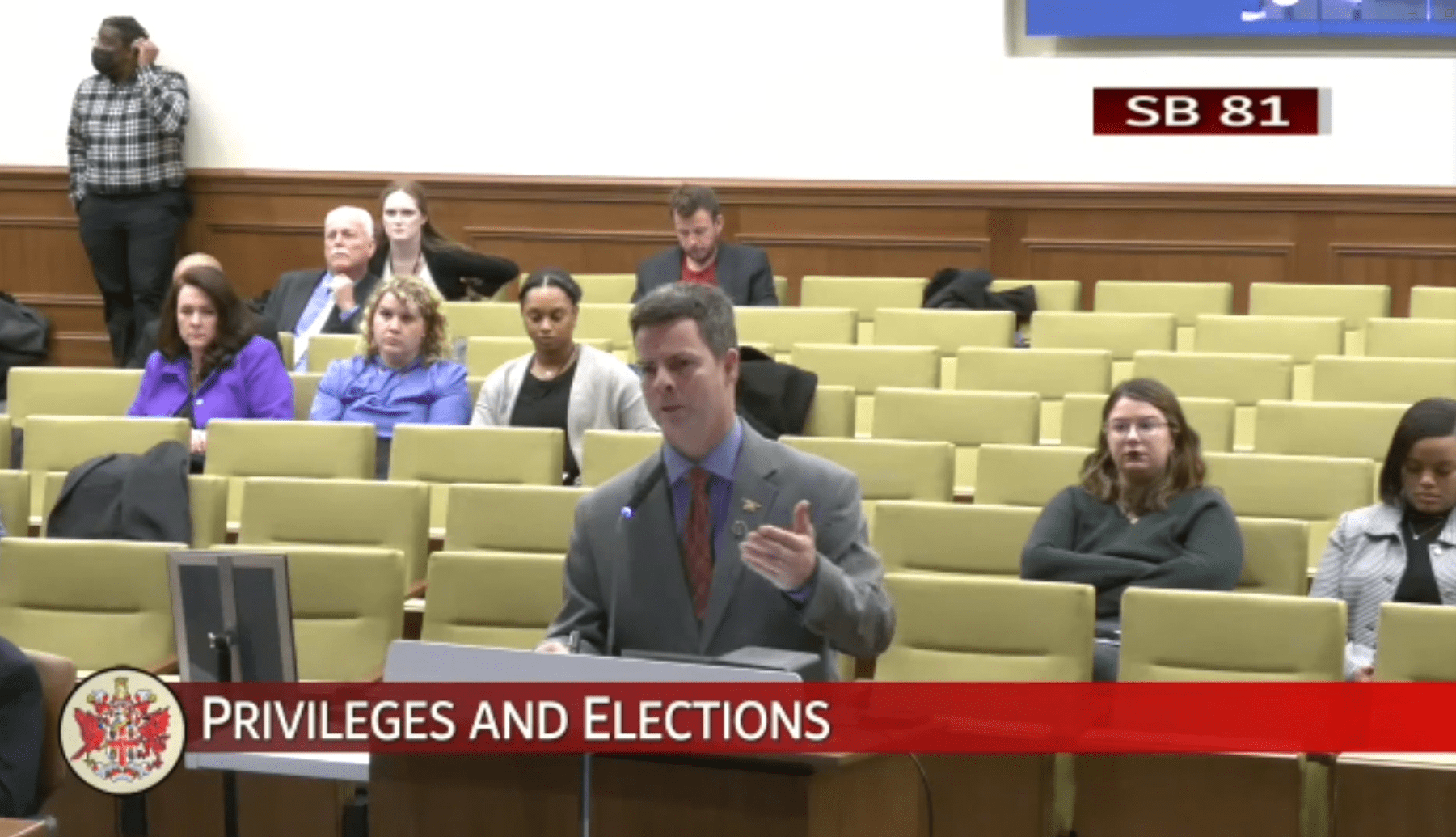Republicans introduced a collection of bills this session meant to impose new restrictions on voting. All were killed Tuesday by the Democratic majority of the Senate Committee on Privileges and Elections.
However, the committee did pass 10-4 a bill by state Sen. David Suetterlein, R-Roanoke County, that would ban candidates from the general election ballot if they previously ran in that year’s primary but dropped out before the primary vote.
Virginia already has a “sore loser” law that says candidates who appear on the primary ballot and lose can’t be on the general election ballot. Suetterlein’s bill is aimed at primary candidates who drop out in time to not be on the primary ballot but then decide to run in November anyway.

According to Suetterlein, the idea for this bill came from a situation in Roanoke County last summer when former school board member Tom McCracken challenged Supervisor Martha Hooker for the Republican nomination in the Catawba District. McCracken later dropped out of the primary, which Hooker won with 88% of the vote, and then ran as an independent during the fall, but dropped out before ballots were printed. Hooker went on to win with 96% of the vote.
“We now have a situation where someone can file as a candidate in their party’s nominations. They have the benefit of seeing where the early vote came from for 41 days and everyone had to pay for it. All the volunteers have put in their time and effort,” Suetterlein told the committee. “They can then withdraw and be nominated by the other party if they don’t already have someone or they could run and file as an independent.”
He said “this current interpretation invites that all the time.”
Suetterlein said the low petition limit for appearing on the ballot in a local race could be a problem someday.
“This probably won’t be a huge thing for the federal races because they have a thousand signatures [requirement],” he told the committee. “But in our races, where you need 250 or 125, I expect this to come up significantly and I also expect this to be happening frequently.”
In the vote, only four members of the committee chose not to report the bill to the full Senate, all Democrats: committee Chairman Aaron Rouse, D-Virginia Beach; Sen. Russett Perry, D-Loudoun County; Sen. Creigh Deeds, D-Charlottesville; and Sen. Adam Ebbin, D-Alexandria.
Del. Joe McNamara, R-Roanoke County, has a companion bill in the House, HB 90. 
State Sen. Bryce Reeves, R-Spotsylvania County, had a similar bill, SB 167, that would have had the same effect — but also would have banned the counting of write-in votes for that candidate.
Reeves said his bill was prompted by a losing candidate in last year’s Republican primary in the Fredericksburg area who later ran as a write-in during the fall state Senate race that was won by Republican Tara Durant. That bill was effectively killed by an 8-6 vote along party lines.
So were three bills by Sen. Mark Peake, R-Lynchburg.
SB 42 would have limited in-person absentee voting to the three-week period immediately preceding an election. As of current law, absentee voting is available beginning on the 45th day prior to an election. Peake expressed concern that a longer early voting period is a hardship on registrar’s offices in small counties that have little staff.
“We looked at the numbers for this past election and two-thirds of early voting occurred in the last two weeks. You get the first day, everybody’s all excited, then nothing and the rush is on the last two weeks,” Peake said to the committee. “Two thirds of all early voting in 14 days.”
However, opponents of the bill have stated that the increased time to vote allows for those who live far away from polling places to vote at a time that’s convenient for them.
“As a retired teacher, I can go when I want to, but when I was working, every voting day was a teacher workday and I would have to get up extremely early, 6 in the morning, voting in New Kent County and driving to Henrico County,” Denise Harrington of the League of Women Voters said in opposition to the bill.
SB 32 would have required a voter to verify their Social Security number at a polling place in correlation with what is on a database approved by the State Board of Elections.
“When people register, I just want them to check their Social Security number to see if it matches their name to see if they are who they say they are,” Peake said to the committee. “If it doesn’t, they can contact them and vote provisionally. They’ve got months and months to bring any kind of ID to say that they are legally allowed to vote.”
However, opponents of the bill such as Tram Nguyen of New Virginia Majority said the systems used to check the numbers can be flawed.
“Since 2009, the Social Security Administration, their office and inspector general have said that their database is flawed in terms of matching for voter registration purposes,” Nguyen said. “We know this has happened in other states where the match hasn’t been great and folks have been unable to register to vote because of this flawed system.”
Peake’s third bill, SB 92, would have eliminated same-day voter registration and required voters to be registered by the day before the election.
“These registrars are dealing with this massive population that comes there to vote,” Peake said to the committee. “Do we expect them to have enough staff to register 1,000 people on Election Day?”
November’s legislative elections saw a rush of same-day voter registrations in some college communities, with about 900 in Blacksburg.

Peake’s fourth bill was identical to one introduced by Sen. John McGuire, R-Goochland County. Their bills, McGuire’s SB 81 and Peake’s SB 45, would have required voters to show a photo ID at the polls.
“Currently in Virginia and across America, the majority of Americans don’t trust our elections and as legislatures and elected officials, we need to do our best to strengthen these trusts within our institutions,” McGuire said to the committee. “In Virginia during our elections, someone can just write a name and an address on a simple ID confirmation form, sign it and vote. They do not have to prove in any way that you are that person.”
But Harrington said that this bill could “take Virginia back, and we already don’t have the best history in voting.”
“My 95-year-old mother-in-law has an ID now, but getting that was a problem because she was born in a house with a midwife and all she had was a little certificate,” Harrington said in opposition of SB 81. “Getting her an ID to get a driver license didn’t come until the ’50s and ’60s.”



